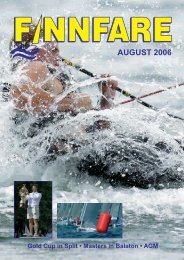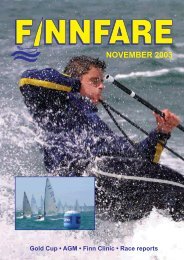Create successful ePaper yourself
Turn your PDF publications into a flip-book with our unique Google optimized e-Paper software.
Charles Currey and Iain Percy in conversation<br />
British <strong>Finn</strong> Medalists 1952 and 2000<br />
by Tim Jeffrey<br />
Iain Percy (second right) was one of British<br />
sailing’s ‘three tenors’ in Sydney, one of trio of<br />
gold medalists in an outstanding Olympics that<br />
garnered five medals in all and near misses in<br />
two other class.<br />
Britain has been a habitual medal winner in<br />
sailing but think of great British Olympians<br />
from previous times and Rodney Pattisson<br />
and Reg White come to mind. Only one other<br />
man has won a medal in <strong>Finn</strong> singlehander<br />
before Percy and that was Charles Currey<br />
(top left, next to Paul Elvström and Rickard<br />
Sarby) in Helsinki, a full 52 years ago.<br />
Until Ben Ainslie succeeded Percy in the <strong>Finn</strong><br />
and won three successive <strong>Finn</strong> Gold Cups,<br />
the class' world championship, Britain’s long<br />
association with the <strong>Finn</strong> had produced only<br />
two other Gold Cup winners: Vernon Stratton<br />
and Chris Law.<br />
Stratton was one of those beaten by Currey<br />
in the 1952 trials, later to become British team<br />
manager and remains a leading light in<br />
Bembridge sailing. Law’s great rival in the<br />
1970s was David Howlett (top right), the man<br />
who has been the continuous thread running<br />
through British <strong>Finn</strong> sailing since then.<br />
Pioneering metal masts from David Hunt’s<br />
Needlespar Howlett was there. The move<br />
to carbon rigs and Mylar sails 10 years ago<br />
Howlett was there. The man behind Percy<br />
and Ainslie Howlett.<br />
The backroom team of British <strong>Finn</strong> sailing is<br />
envied around the world. When Ainslie moved<br />
across from the Laser to the bigger, heavier<br />
singlehander, Polish 1996 gold medalist<br />
Mateusz Kusnierewicz expected the younger<br />
Briton to both be a threat to the dominance<br />
of the class that he and Belgian Sebastien<br />
Godefroid enjoyed because of his talent. And<br />
because, the Pole, added: “He’s got Sid.”<br />
(Howlett’s nickname).<br />
Percy had a leading part in this, a tuning partner<br />
to Richard Stenhouse in 1996, and bringing<br />
along the likes of Andrew Simpson and Charlie<br />
Cumbley as his trial jockeys for 2000, a role they<br />
are playing for Ainslie now. Such support was<br />
absent, anathema even, in the Currey era.<br />
To find out just different things were, Yachting<br />
World brought the two British <strong>Finn</strong> medalists<br />
together.<br />
18<br />
Iain: People talk about eras in sailing: the<br />
Kiwis dominated for a while, the Americans,<br />
now perhaps the Brits, but for a long time it<br />
was the northern Europeans, particularly the<br />
Danes and men such as Paul Elvström.<br />
Charles: The extraordinary skill of Elvström<br />
was that just at the gun he had the knack of<br />
getting way on. People would line up at the<br />
start, and he was never early, and he'd shoot<br />
out of the ruck.<br />
Iain: Ben Ainslie’s a bit like that! (Laughter)<br />
Charles: Every time... tonk! Elvström was<br />
away. There he was. Perfect acceleration.<br />
Iain: What about Helsinki In Sydney, we<br />
sailed both in the ocean and close to the city<br />
in the harbour. It was very changeable.<br />
Charles: We were all mixed up amongst the<br />
islands. I used to talk to Elvström a lot. The<br />
winds and the tides were very complex. I said<br />
‘Paul, I sit and look at the chart and imagine<br />
the water as molten lead flowing around the<br />
islands.’ I used to sit and look at the water<br />
and think ‘what’s the lead going to do today’<br />
Iain: That’s like the flow diagrams we use<br />
now. Water’s always got to go somewhere.<br />
There were some great Elvström stories<br />
weren’t there What about when the tide<br />
went out Didn’t he go ashore or something<br />
Charles: That was a Gold Cup at Whitstable.<br />
No one thought of the obvious solution which<br />
was to pick up the mark and take it out to the<br />
boats!<br />
Iain: So your Games in 1952 was the first<br />
the <strong>Finn</strong> was used in<br />
Charles: It was designed by Rikard Sarby.<br />
We were given the boats and the masts just<br />
didn’t bend at all. There were a fir tree! They<br />
just stood upright like a Christmas tree.<br />
Iain: Really! So they were all completely<br />
different.<br />
Charles: Elvström spent a long time with a<br />
hand draw-knife making his mast so that it<br />
would bend. He was quite good at chippy work!<br />
Iain: Carbon masts don’t bend much either,<br />
but the sails are designed for it.<br />
Charles: They bend exactly as you want<br />
them to.<br />
Iain: I remember we did something like that<br />
in ‘96 when we were helping Richard<br />
Stenhouse. The difference there was that we<br />
had an oven and were cooking carbon on<br />
the side. It was a little more efficient where<br />
one strip of carbon on the side could make<br />
a mast 10% stiffer.<br />
Charles: That must have worked pretty well.<br />
You could control the amount of change.<br />
Iain: And you could sand it too, to get even<br />
more precise a control. You could get very,<br />
very exact, but the principal is just the same.<br />
And you are still trying to make the mast fit<br />
the sail.<br />
There’s a wonderful photograph on the<br />
podium (above), you one side of Elvström<br />
and Sarby the other side.<br />
Charles: I was the smart chap with his thumbs<br />
going down the seams of his trousers. Navy<br />
training! Rikard didn’t know how to hold the<br />
bouquet of flowers we were presented with.<br />
‘Hold it like a baby!’, I said. ‘But I don't have<br />
a baby!’ he replied.<br />
Iain: How were your trials Our system is<br />
now very complicated though it produces a<br />
strong squad.<br />
Charles: We had a one week competition in<br />
Torbay. Vernon Stratton was there, he was<br />
very good. So was his wife, Pepe, in light<br />
winds. A lot of evil things went on in the<br />
selection. I knew about it. I had the most,<br />
beautiful old fashioned <strong>Finn</strong> which was just<br />
perfect, but I wasn’t allowed to use it. We<br />
couldn’t sail our own boats; the boats were<br />
supplied. I knew even before we went racing<br />
who had the best boat and who had the worst<br />
boat and that was me. I wasn’t worried about<br />
it. It only took one tack after the start of the<br />
first race for me to sail through the chap who<br />
had the best boat. The whole thing was fixed<br />
up, but I knew about it.<br />
Iain: It says in this newspaper report that you<br />
were 5th in the first race and won the second<br />
Vernon Stratton, Stuart Jardine, Ian Butlerthey’re<br />
all mentioned.<br />
Charles: I didn’t want to make it too obvious!<br />
It may have been a different then, but there<br />
was still all the devilment that goes on today.<br />
Iain: I see this was the first time the Germans<br />
were at the Games since the War. Did that<br />
cause controversy<br />
Charles: A little. But there wasn’t much hoohah<br />
about it.<br />
Iain: And the USSR came for the first ime .<br />
Did people think it was cheating combining<br />
all those countries!<br />
Charles: There was some politiciing of that<br />
but I don't think anyone cares any more about<br />
that sort of thing. It’s the sport that matters.<br />
Iain: I heard that even during the height of<br />
the Cold War, sailors would still chat. Russian,




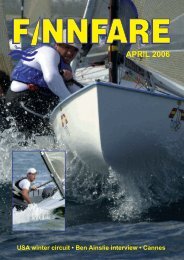
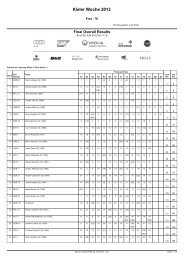
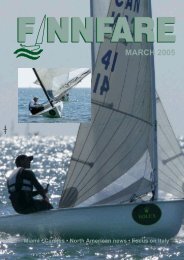
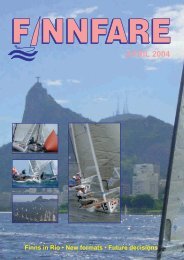
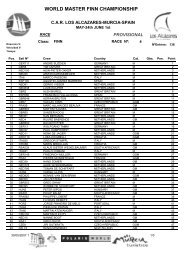
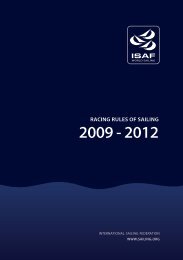
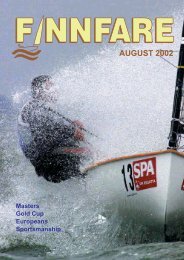
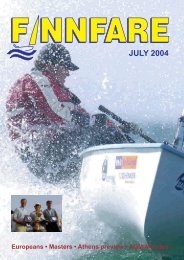
![[PDF] November 2006 - Finn](https://img.yumpu.com/6991693/1/184x260/pdf-november-2006-finn.jpg?quality=85)
